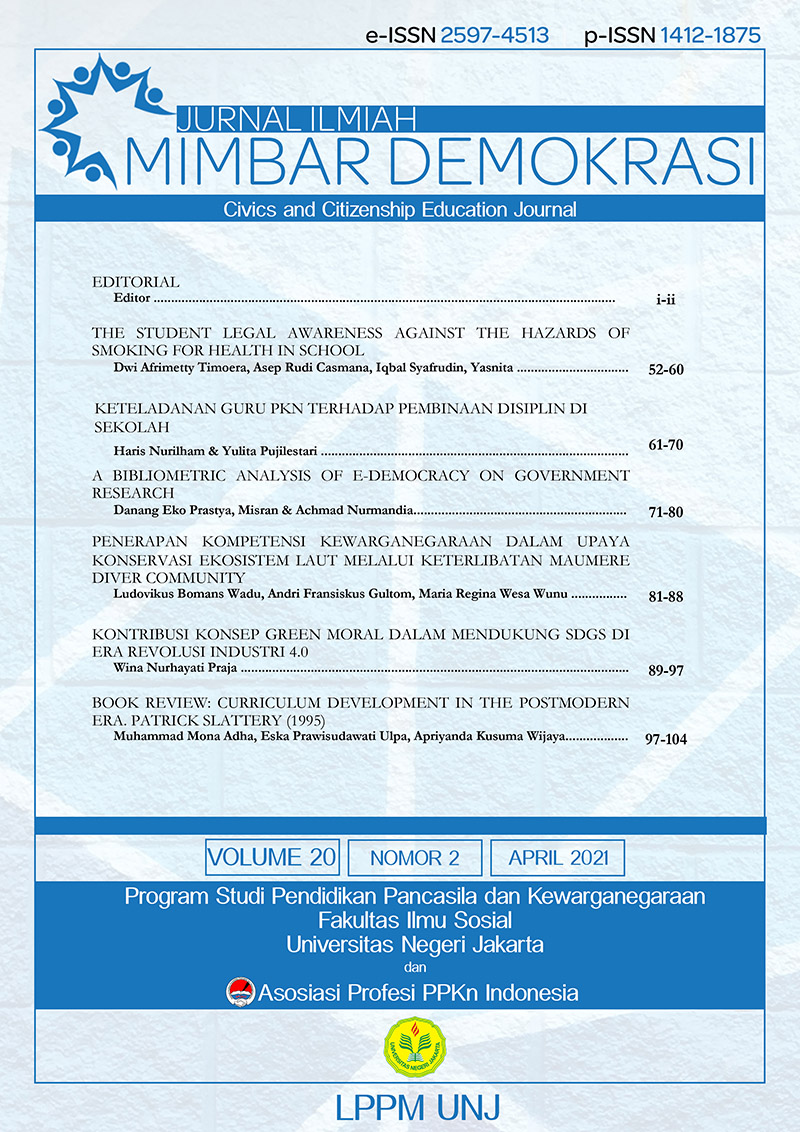A bibliometric analysis of E-Democracy on government research
DOI:
https://doi.org/10.21009/jimd.v20i2.19772Keywords:
E-democracy, Government research, literature review, scopus paperAbstract
ABSTRACT
This study aims to determine the development of research with the theme E-Democracy on Government in the last ten years from 2011 to 2020. The research method uses qualitative research with literature review or literature review. Data were collected by accessing journals on Scopus and obtaining 120 high-citation articles with ten years from 2010 to 2020. Data analysis used the Vosviewer and Nvivo 12 Plus applications. The results showed that 120 journals studied E-Democracy on Government from 2010 to 2020, with the most significant contributor being the United States. Government Information Quarterly is a popular journal with the most discussion on e-democracy. This study's limitation is that the articles reviewed were only obtained from the Scopus database, so they did not have comparable data. Consequently, future studies need to use a comparative analytical approach involving the Scopus database and the Web of Sciences (WoS).
ABSTRAK
Analisis Bibliometrik E-Demokrasi pada Riset Pemerintah. Penelitian ini bertujuan untuk mengetahui perkembangan penelitian dengan tema E-Democracy on Government dalam kurun waktu sepuluh tahun terakhir dari tahun 2011 hingga 2020 .Metode penelitian menggunakan penelitian kualitatif dengan kajian pustaka atau literature review. Data dikumpulkan dengan mengakses jurnal di Scopus dan diperoleh 120 artikel bersitasi tinggi dengan rentang waktu 10 tahun dari 2010 hingga 2020. Analisis data menggunakan aplikasi Vosviewer dan Nvivo 12 Plus. Hasil penelitian menunjukan terdapat 120 jurnal yang mengkaji E-Democracy on Government pada tahun 2010 hingga 2020 dengan negara penyumbang terbesar ialah United States. Government Information Quarterly menjadi jurnal yang populer dengan pembahasan e-demokrasi terbanyak. Keterbatasan dari penelitian ini adalah artikel yang direview hanya diperoleh dari database Scopus sehingga tidak memiliki data pembanding. Akibatnya, studi masa depan perlu menggunakan pendekatan analisis komparatif yang melibatkan database Scopus dan Web of Sciences (WoS)
References
Alcaide–Muñoz, Laura, Manuel Pedro Rodríguez–Bolívar, Manuel Jesús Cobo, dan Enrique Herrera–Viedma. (2017). “Analysing the scientific evolution of e-Government using a science mapping approach.” Government Information Quarterly 34(3): 545–55. http://dx.doi.org/10.1016/j.giq.2017.05.002.
Aribowo, Eric Kunto. (2019). “Analisis Bibliometrik Berkala Ilmiah Names: Journal of Onomastics Dan Peluang Riset Onomastik Di Indonesia.” Aksara 31(1): 85.
Bastick, Zach. (2017). “Digital limits of government: The failure of e-democracy.” Public Administration and Information Technology 25: 3–14.
Edwards-Jones, Andrew. (2014). “Qualitative data analysis with NVIVO.” Journal of Education for Teaching 40(2): 193–95. https://www.tandfonline.com/doi/abs/10.1080/02607476.2013.866724 (November 6, 2020).
Fauzy, Akhmad. (2016). Pemetaan Keunggulan Riset Berbasis Publikasi Terindeks Scopus. Yogyakarta. https://www.researchgate.net/publication/318914126_Pemetaan_Keunggulan_Riset_Berbasis_Publikasi_Terindeks_Scopus.
Funilkul, Suree, dan Wichian Chutimaskul. (2009). “The framework for sustainable eDemocracy development.” Transforming Government: People, Process and Policy 3(1): 16–31.
Kardan, Ahmad A., dan Ayoob Sadeghiani. (2011). “Is e-government a way to e-democracy?. A longitudinal study of the Iranian situation.” Government Information Quarterly 28(4): 466–73. http://dx.doi.org/10.1016/j.giq.2010.12.007.
Kneuer, Marianne. (2016). “E-democracy: A new challenge for measuring democracy.” International Political Science Review 37(5): 666–78.
Kollmann, Tobias, Ina Kayser, dan Christoph Stöckmann. (2012). “Acceptance of electronic democracy: An empirically validated approach.” Electronic Government 9(4): 370–87.
Kreiss, Daniel. (2015). “The Problem of Citizens: E-Democracy for Actually Existing Democracy.” Social Media and Society 1(2).
Lee, Chung Pin, Kaiju Chang, dan Frances Stokes Berry. (2011). “Testing the Development and Diffusion of E-Government and E-Democracy: A Global Perspective.” Public Administration Review 71(3): 444–54.
Moleong, Lexy J. (2012). “Metodologi penelitian kualitatif (Cet. Ke-30.).” Bandung: Remaja Rosdakarya.
Moss, Giles, dan Stephen Coleman. (2014). “Deliberative manoeuvres in the digital darkness: E-Democracy policy in the UK.” British Journal of Politics and International Relations 16(3): 410–27.
Muhuri, Pranab K., Amit K. Shukla, dan Ajith Abraham. (2019). “Industry 4.0: A bibliometric analysis and detailed overview.” Engineering Applications of Artificial Intelligence 78: 218–35. https://www.sciencedirect.com/science/article/abs/pii/S0952197618302458 (November 24, 2020).
Nchise, Abinwi C. (2012). “The trend of E-democracy research: Summary evidence and implications.” ACM International Conference Proceeding Series: 165–72.
Nchise, A., Ngwa, O., & Mbarika, V. (2011, May). Toward a Sustainable E-Participation Model in Sub Saharan Africa. In Conference for E-Democracy and Open Government: 171-179.
Norris, Donald F., dan Christopher G. Reddick. (2013). “E-democracy at the American grassroots: Not now not likely.” Information Polity 18(3): 201–16.
Oni, A. A., C. K. Ayo, S. Oni, dan V. W. Mbarika. (2016). “Strategic framework for e-democracy development and sustainability.” Transforming Government: People, Process and Policy 10(3): 457–77.
Päivärinta, Tero, dan Øystein Sæbø. (2006). “Models of E-Democracy.” Communications of the Association for Information Systems 17(1).
Perianes-Rodriguez, Antonio, Ludo Waltman, dan Nees Jan van Eck. (2016). “Constructing bibliometric networks: A comparison between full and fractional counting.” Journal of Informetrics 10(4): 1178–95. http://dx.doi.org/10.1016/j.joi.2016.10.006.
Toots, Maarja. (2019). “Why E-participation systems fail: The case of Estonia’s Osale.ee.” Government Information Quarterly 36(3): 546–59. https://doi.org/10.1016/j.giq.2019.02.002.
van Eck, Nees Jan, dan Ludo Waltman. (2010). “Software survey: VOSviewer, a computer program for bibliometric mapping.” Scientometrics 84(2): 523–38.
Zadra, Michele. (2020). “Do Central Government e-Democracy Reforms Work for Mid-Size Municipalities? A Case Study of the Long-Term Effects of e-Petitioning in Southampton.” 14th ECPR General Conference (August): 1–20.








